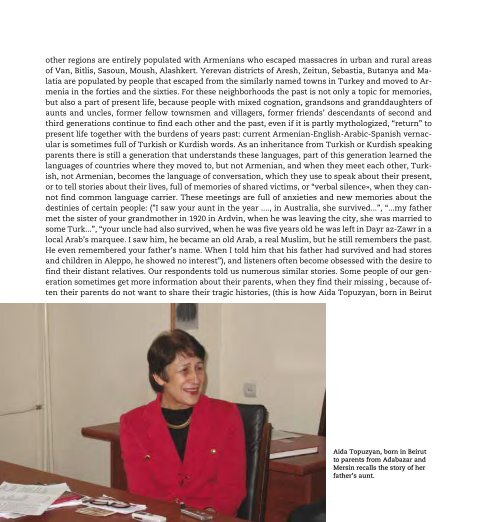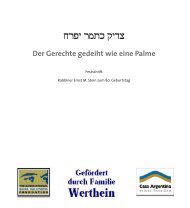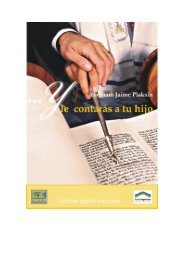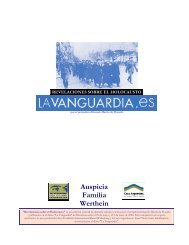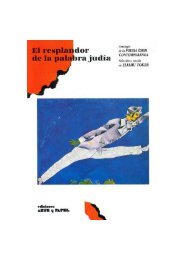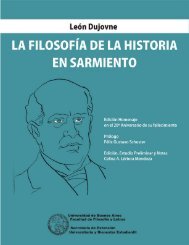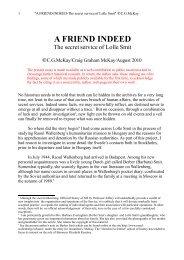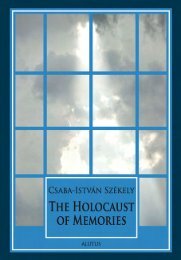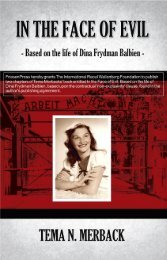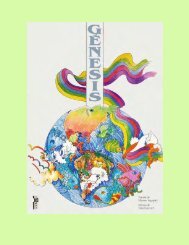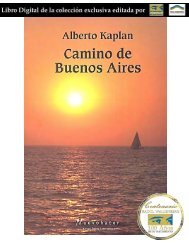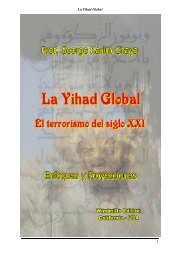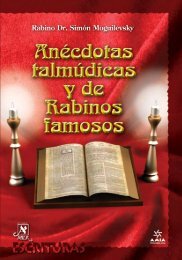other regions are entirely populated with Armenians who escaped massacres in urban and rural areasof Van, Bitlis, Sasoun, Moush, Alashkert. Yerevan districts of Aresh, Zeitun, Sebastia, Butanya and Malatiaare populated by people that escaped from the similarly named <strong>to</strong>wns in Turkey and moved <strong>to</strong> Armeniain the forties and the sixties. For these neighborhoods the past is not only a <strong>to</strong>pic for memories,but also a part of present life, because people with mixed cognation, grandsons and granddaughters ofaunts and uncles, former fellow <strong>to</strong>wnsmen and villagers, former friends’ descendants of second andthird generations continue <strong>to</strong> find each other and the past, even if it is partly mythologized, “return” <strong>to</strong>present life <strong>to</strong>gether with the burdens of years past: current Armenian-English-Arabic-Spanish vernacularis sometimes full of Turkish or Kurdish words. As an inheritance from Turkish or Kurdish speakingparents there is still a generation that understands these languages, part of this generation learned thelanguages of countries where they moved <strong>to</strong>, but not Armenian, and when they meet each other, Turkish,not Armenian, becomes the language of conversation, which they use <strong>to</strong> speak about their present,or <strong>to</strong> tell s<strong>to</strong>ries about their lives, full of memories of shared victims, or “verbal silence», when they cannotfind common language carrier. <strong>The</strong>se meetings are full of anxieties and new memories about thedestinies of certain people: (”I saw your aunt in the year ...., in Australia, she survived...”, “...my fathermet the sister of your grandmother in 1920 in Ardvin, when he was leaving the city, she was married <strong>to</strong>some Turk...”, “your uncle had also survived, when he was five years old he was left in Dayr az-Zawr in alocal Arab’s marquee. I saw him, he became an old Arab, a real Muslim, but he still remembers the past.He even remembered your father’s name. When I <strong>to</strong>ld him that his father had survived and had s<strong>to</strong>resand children in Aleppo, he showed no interest”), and listeners often become obsessed with the desire <strong>to</strong>find their distant relatives. Our respondents <strong>to</strong>ld us numerous similar s<strong>to</strong>ries. Some people of our generationsometimes get more information about their parents, when they find their missing , because oftentheir parents do not want <strong>to</strong> share their tragic his<strong>to</strong>ries, (this is how Aida Topuzyan, born in Beirut92Aida Topuzyan, born in Beirut<strong>to</strong> parents from Adabazar andMersin recalls the s<strong>to</strong>ry of herfather’s aunt.
<strong>to</strong> parents from Adabazar and Mersin, faced her past, when in the seventies she found her father’s auntin the USA).<strong>The</strong> last twenty years have provided such memories with a new feed source. <strong>The</strong>re is now an opportunity<strong>to</strong> visit Turkey and see their lost homeland (the narrative of such s<strong>to</strong>ry is included in this book). Peoplego and find the villages of their predecessors, sometimes also the house they lived in, important placestheir grandfathers <strong>to</strong>ld them about; the cemetery, church, sacred places, trees, forests. When they telltheir s<strong>to</strong>ry they usually say “our village”, “our house”, “and our forest». And with sacred fear they bringwith them flowers and fruits their predecessor’s saw and loved, the stream water they cherished. <strong>The</strong>ysometimes even meet people who remember the past and talk with them, and these visits become newFlowers from the outskirts of the Khastur 1 village of Alashkert 2 , brought in 2007.1 Khastur (Khanzer, Hatstur).2 Alashkert-(Alashgerd, Elishkirt, Toprakkale, Toprakghala, Toprakkhala, Toprakkala, Toprakkale, Topraghkala, Topraghkale,Topragkale, Topraqkala, Topraqkale, Topraqqale, Valashkert, Valarkert, Vaghashakert, Vagharshakert). Up <strong>to</strong> 1914 was asettlement in Bayazet, in Karin /Erzrum/ state, with the center in Alashkert. It was located in the bed of one of the tributariesof Sharian river, a right-side tributary of Eastern Euphrates, on the road of Trabzon-Erzrum-Maku-Tabriz.93
- Page 2 and 3:
Published by:Institut für Internat
- Page 5 and 6:
ContentsForeword...................
- Page 7 and 8:
ForewordThe project “Adult Educat
- Page 10 and 11:
Aras, Yasin Aras, Welat Ay, Cenk Ce
- Page 12 and 13:
The main audience of this book is o
- Page 15 and 16:
“Wish they hadn’t left”:The B
- Page 17 and 18:
ed by 1915 and where memories of Ar
- Page 19 and 20:
1915 tends to be represented by int
- Page 21 and 22:
Yet to a large extent, Turkish inte
- Page 23 and 24:
this, we can’t. It’s impossible
- Page 25 and 26:
een very advanced in trade and craf
- Page 27 and 28:
How to Come to Terms with Phantom P
- Page 29 and 30:
It is always you who has to be nice
- Page 32 and 33:
to the way he was raised: “They f
- Page 34 and 35:
empathize with Armenians: “My aun
- Page 36 and 37:
Adil is not the only one marked by
- Page 38 and 39:
ness may be an attempt to overcome
- Page 40 and 41:
dernity and the oral transmission o
- Page 42 and 43: A soup pot with spoons around itAt
- Page 44 and 45: What if My Mother is Armenian?Ruhi
- Page 46 and 47: If I were younger I’d get baptize
- Page 48: with butter. We’ll serve the impo
- Page 51 and 52: The time Salih and Gavrik are worki
- Page 53 and 54: Turkey’s changing context is refr
- Page 55 and 56: ‘It was to be expected.’ And my
- Page 57 and 58: against one another. The feet of th
- Page 59 and 60: Fear of Losing a CityZübeyde was b
- Page 61 and 62: half for me.’ But what do our Mus
- Page 63 and 64: e discussed when the kids were arou
- Page 65 and 66: possible by the difference in relig
- Page 67 and 68: The Charm of AraratMehmet is a 62-y
- Page 69 and 70: dogs protected the sheep against wo
- Page 71 and 72: The Story of the “Night People”
- Page 73 and 74: “I don’t know why, but my grand
- Page 75: Research in Armenia:“Whom to Forg
- Page 78 and 79: and can generally be located in Tur
- Page 80 and 81: “Whom to Forgive? What to Forgive
- Page 82 and 83: “Private Stories”After the esta
- Page 84 and 85: Recalling MemoriesOral history diff
- Page 86 and 87: In the village of Ujan, where the v
- Page 88 and 89: The home-museum of Gevork Chaush in
- Page 90 and 91: Memorial in the Ashnak village dedi
- Page 94 and 95: sources and materials for their mem
- Page 96 and 97: Ergir’s Soil is Strong, Ergir’s
- Page 98: Tatevik, the granddaughterof Mihran
- Page 101 and 102: eral meanings in Armenian -”whole
- Page 103 and 104: The Gospel with Golden Binding of S
- Page 105 and 106: keeps a copper chalice that was bro
- Page 107 and 108: In some families the passports of t
- Page 109 and 110: at that time, Mustafa and Jamal, wh
- Page 111 and 112: People were so frightened to lose g
- Page 113 and 114: naked, they were decapitating every
- Page 115 and 116: Water, Fire, Desert“There was an
- Page 117 and 118: his mother dragged him behind her,
- Page 119 and 120: Many of our narrators mention the R
- Page 121 and 122: In the word-stock of the survivors
- Page 123 and 124: in Kurdish villages, and helping th
- Page 125 and 126: “Well, They Are Human Too”Even
- Page 127 and 128: member this well, they said, the el
- Page 129 and 130: speak to each other. Questioned by
- Page 131 and 132: Hamze Ptshuk, survived from Hosnut
- Page 133 and 134: “I don’t Know...”Why did this
- Page 135 and 136: “My Dear Almast, Write it Down, W
- Page 137 and 138: took his rifle and ran. The dog fel
- Page 139 and 140: she didn’t tell it to me. In the
- Page 141 and 142: elder guy in this house died and hi
- Page 143 and 144:
AH - Turks always killed to get int
- Page 145 and 146:
“My Father used to Tell us at Hom
- Page 147 and 148:
person... I have never seen him, bu
- Page 149 and 150:
gotten what you knew”. So, out of
- Page 151 and 152:
a paid Adult Residential Facility,
- Page 153 and 154:
It was probably after 60s... My fat
- Page 155 and 156:
the Vardevar 1 day . Even if we mak
- Page 157 and 158:
that this wasn’t a dream... and..
- Page 159 and 160:
was our historical village. Nich, I
- Page 161 and 162:
just filming around myself with no
- Page 163 and 164:
that person whether I could take a
- Page 165:
[Turk. wife]”. In the morning I t
- Page 168 and 169:
4 Albert Mamikonyan,1953, in Kirova
- Page 170 and 171:
11 Almast Harutyunyan,1920, Ujan vi
- Page 172 and 173:
18 Eleonora Ghazaryan.1949, Ashnak
- Page 174 and 175:
26 Nairi Tajiryan,1936, Egypt (Cair
- Page 176:
33 Vazgen Ghukasyan,1933, Ashnak vi


